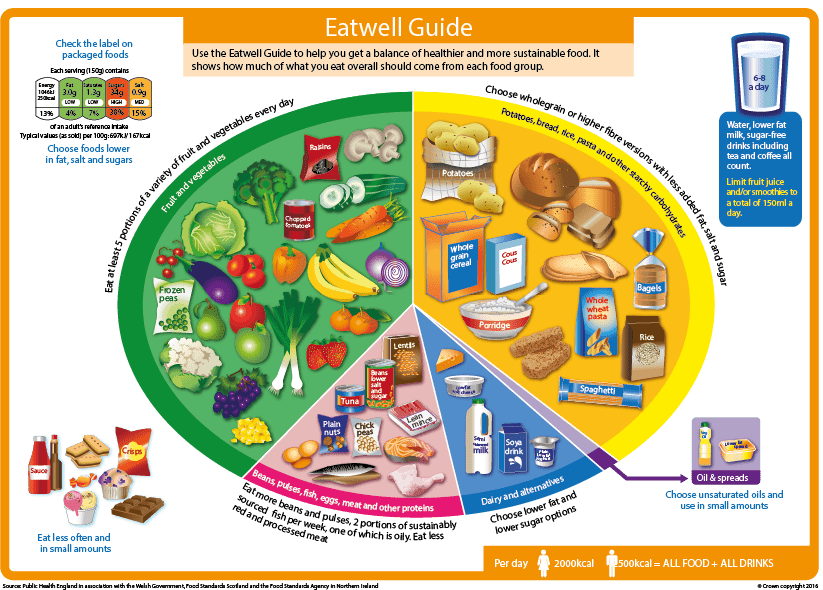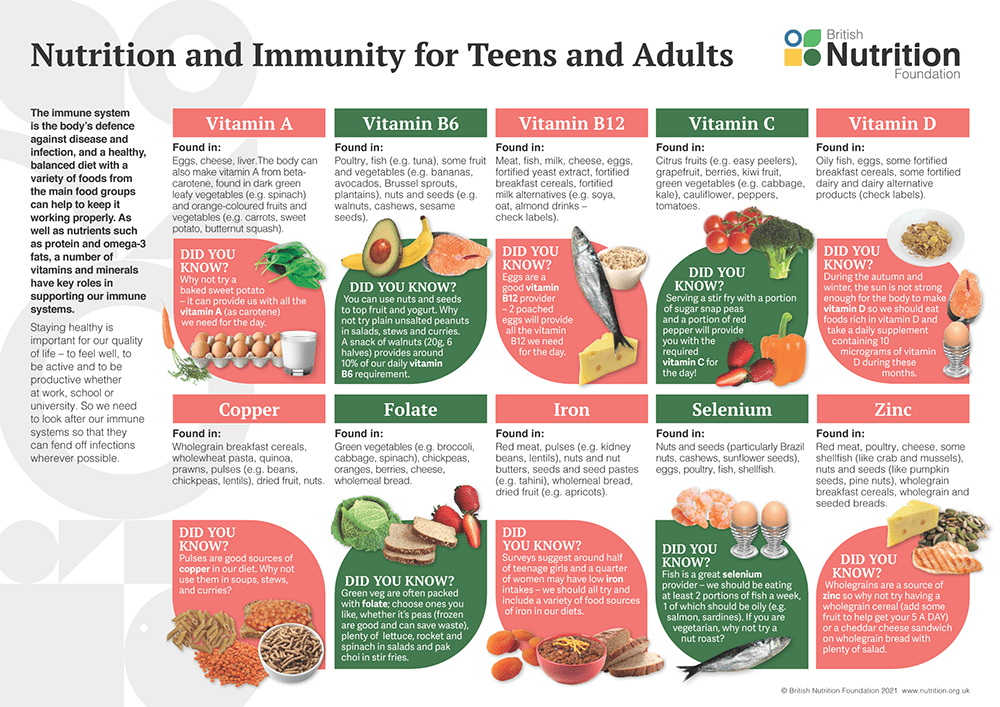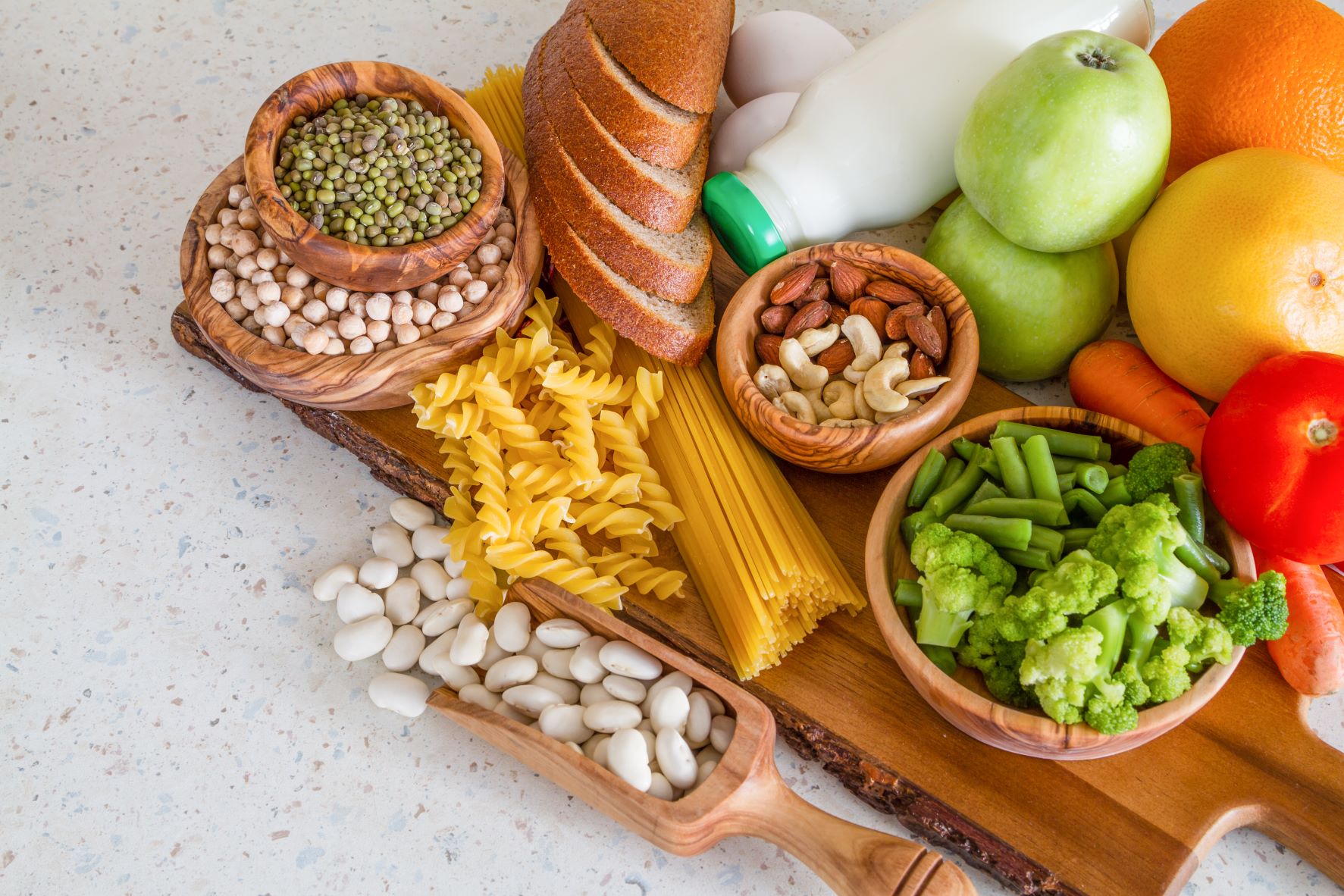Nutrition is often considered one of the building blocks of health and well-being. Without good nutrition it is difficult to see how we would be able to function in a way which is effective and efficient.
The Eatwell Guide
In the UK, the Eatwell Guide serves as a visual representation of what a healthy, balanced diet looks like. Whilst it is not perfect in its representation, particularly for some ethnic groups, the principles are based around an individual consuming at least 5 portions of fruit and vegetables per day, with carbohydrates being from unrefined, wholegrain varieties, protein from vegetables and lean animal sources, including oily fish and the use of small amounts of added fat.

It is worth noting the section in the left-hand bottom corner. These are foods that are described as being high in fat, sugar and salt, or highly processed foods. Notice how they are present, but not part of the main section. That is because it is accepted that they are part of our diet, but that they should not be regarded as being a major part, instead an occasional treat maybe. The guide is intended for the general population, so for some individuals with specific health conditions, such as diabetes, or those with allergies or intolerance, so modification to the guide will need to be made, but the principles of keeping food as fresh and unrefined as possible remains.
Nutritional principles for immune health
There are some nutrients which are essential to immunity and a lot of information is available, particularly since the COVID-19 outbreak. There appears to have been an increase in promotions of nutritional supplements, claiming to boost the immune system. While it sounds like an appealing idea to think that taking a single pill a day can improve our immune system, sadly it is not as effective as you would like to think. In fact, taking large amounts of vitamins and minerals can be harmful to the immune system and the rest of your body.
It is important that anyone with underlying health conditions and / or taking regular medication, should check with their pharmacist or doctor before taking any supplements and if advised to take a supplement by a medical practitioner continue to do so.
When it comes to spending money on supplements, it would be a much better investment to spend it on good quality food.
Our top tips for good nutrition include:
- Eat a colourful mix of at least 5 portions of fruit and vegetables, which can provide a variety of vitamins and minerals, need by the immune system, such as vitamin E, Vitamin C, Selenium and Zinc.
- Choose wholegrain, unrefined carbohydrates, to provide slow releasing energy and a valuable source of soluble and insoluble fibre.
- A variety of protein, which is needed to make the components of the immune system which you saw earlier.
- Drink plenty of water urine colour is a good guide. Hydration doesn’t necessarily protect you from germs and viruses, but preventing dehydration is important to your overall health. Dehydration can cause headaches and hinder your physical performance, focus, mood, digestion, and heart and kidney function. These complications can increase your susceptibility to illness.
- Avoid foods and drinks which are high in sugar; these increase insulin secretion and have been shown to ‘stress’ the body, negatively impacting the immune system.
- Excessive restriction of the diet can lead to serious health complications and studies have shown that these diets if sustained for more than several months can result in nutritional deficiencies which can increase susceptibility to infection and a delay in recovery.
Specific nutrients
The immune system is a complex network of cells and chemical compounds that help defend the body against infections. Several different nutrients are involved in supporting our immune systems to work normally so that we can deal with infections.
A food-first approach should be taken before considering supplementation, except for vitamin D. Public Health England recommend that we take a daily supplement of vitamin D, at a dosage of 10 µg or (400IU) through the winter months (October- March)
These are outlined in the table below and you will see that you can find these immune-supporting nutrients in a wide range of foods. Having a healthy, varied diet is the best way to get all the nutrients that are important for your immune system, as well as all the other systems of the body.
| Nutrient | Role in Immune System | Food Sources |
| Vitamin A | Helps support T-Cells (a type of white blood cells, aiding identification of pathogens) | Liver and cheese (pre-formed vitamin A), dark green leafy veg and orange-coloured fruits & veg, sources of carotenoids which can be converted to Vitamin A |
| Vitamin B6 | Helps produce new immune cells, metabolism antibodies and aids immune cells to communicate | Poultry, fish, fortified breakfast cereals, egg yolk, yeast extract, soya beans, sesame seeds & some fruit and veg (banana, avocado, green peppers) |
| Vitamin B12 | Helps to produce new immune cells | Meat, fish, shellfish, milk, cheese, eggs, fortified yeast extract & fortified breakfast cereals |
| Vitamin C | Aids immune cells to attack pathogens, helps clear away old immune cells from the site of infection and helps to maintain the skin, our external barrier to infection | Citrus fruits, blackcurrants, strawberries, papaya, kiwi, green vegetables, peppers, and tomatoes |
| Copper | Helps to protect and fuel immune cells | Bread, breakfast cereals, rice, quinoa, meat, fish & shellfish, pulses, avocado, dried fruits, nuts & seeds |
| Vitamin D* | Role not clear, but a low status is associated with reduced immune response | Oily fish, eggs, fortified breakfast cereals, fortified spreads and fortified dairy products* |
| Folate | Helps produce new immune cells | Green vegetables, pulses, orange, berries, nuts and seeds, cheese, bread, and fortified breakfast cereals |
| Iron | Helps maintain the health of immune cells | Offal, red meat, beans, pulses, nuts & seeds, fish (canned sardines, cockles & mussels), quinoa, wholegrain bread, and dried fruits |
| Selenium | Helps produce new immune cells and can help to strengthen to infection | Nuts and seeds (e.g., nuts, cashews, sunflower seeds), eggs, offal, poultry, fish, and shellfish |
| Zinc | Helps produce new immune cells, helps develop ‘natural killer cells’ that help to fight off viruses and supports communication between immune cells | Meat, poultry, cheese, some shellfish (crab, cockles, mussels), nuts and seeds (pumpkin seeds and pine nuts), wholegrain breakfast cereals and wholegrain and seeded breads |
When it comes to vitamin and mineral supplements, we do not have evidence that these can prevent or treat viral infections. There is some evidence that vitamin C may reduce the duration and severity of the common cold, but this is caused by a different type of virus, and it is not clear whether vitamin C would have any effect on coronavirus symptoms. There has also been some research into the effect of zinc supplements, in particular zinc lozenges, on the common cold but more research is needed to determine the dosage and formulations of zinc that may have any clinical benefit. Again, we don’t know that supplements would have any benefit to protect against coronavirus.
If you are worried that your diet will not provide you with all you need, then you could consider a supplement – a multivitamin and mineral supplement may be the best approach so that you get a range of vitamins and minerals. However, it is best to try to eat well as a healthy diet can provide a range of natural compounds that you will not find in supplements.

The digestive system; its role in our immunity
The digestive system is home to over 10,000 species of bacteria, which are essential to our health and wellbeing. The bacteria, or microbiota aid with the digestion of food we eat, aids the production of vitamins, act as a line of defence against potential pathogenic (harmful) bacteria getting into our bodies and have a role in our mood and hormone balance. Research has shown that most of the serotonin (a hormone which can elevate mood and alertness), is produced in the gut, aided by the microbiota, in addition to having a role in satiety, signally the brain to tell it that there is ample food. The latter is important for weight regulation, aiding portion control and energy balance. Therefore, can play an important role in reducing the risk of being overweight or obese.
Obesity affects the immune system by reducing the number and function of white blood cells needed to fight infection, also stop to consider the organs we discussed earlier that are involved in our immune system where they are located, how do they function when we accumulate weight
Research into how we can support the maintenance of this careful balance of bacteria, has led to the production of probiotics. These are defined as ‘Good’ bacteria found in food products or supplements that can beneficially affect our health by improving the balance and function of the gut bacteria.
Natural sources of probiotics include:
- Plain/Live Culture Yogurt
- Kefir
- Kombucha Tea
- Miso
- Fermented veg – pickles, sauerkraut, kimchi
- Tempeh
Supplements are available which contain probiotics, although due to poor regulation of the marketing of these products it is not always possible to determine the amount of probiotic they contain, or what degree will arrive in the gut after ingestion.
Prebiotics defined as which the microflora ferment, to produce substances which keep your gut healthy and can make positive changes to your gut microbiome.
Sources of prebiotics include:
- Vegetables (especially artichokes, onions, garlic, asparagus & leeks)
- Fruit (especially bananas and berries)
- Legumes, beans, and pulses
It should be noted that whilst antibiotics are necessary for overcoming bacterial infection, oral or intravenous antibiotics will kill the ‘good’ bacteria in the gut also. Therefore, it can be advised to fortify your diet with sources of pre- and pro- biotics whilst taking anti-biotics. If you are unsure on how to do this speak to your GP or pharmacist, especially if you are regularly taking other medications or have pre-existing health conditions.
Smart Swaps
- Reduce caffeine – swap for green tea, or other healthier alternatives
- Reduce refined sugars – snack on fruit instead! Discuss importance of blood sugar balancing.
- Reduce alcohol- have alcohol free days and remind of the public health guidelines- 2-3 units max per day
- Reduce emotional over-eating- develop healthier coping mechanisms
- Importance of not skipping meals, following fad diets, and going hungry. Focus on abundance mindset, meaning nourishing ourselves on a cellular level with the abundance of healthy delicious food available to us. Prepare meals in advance if it makes things easier and have healthy snacks to hand.
Looking for more from ToHealth?
Looking to find out more about our Health Screenings? Click here
Interested in improving employee health through smart DNA and epigenetics testing? Click here.


